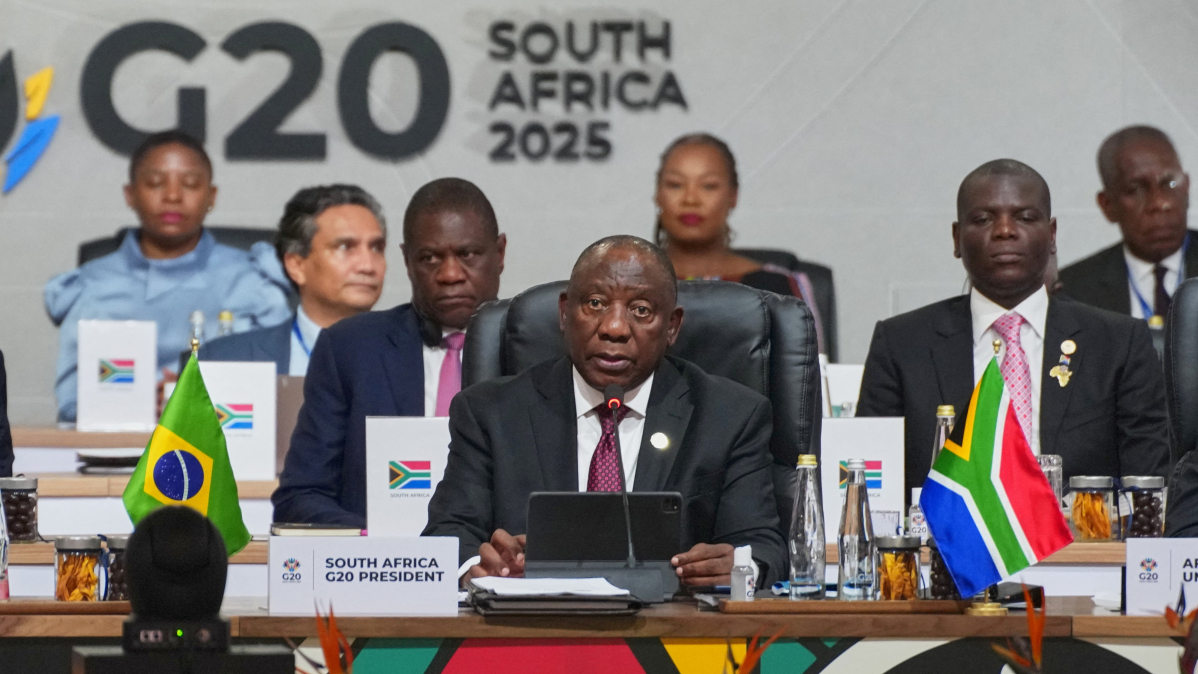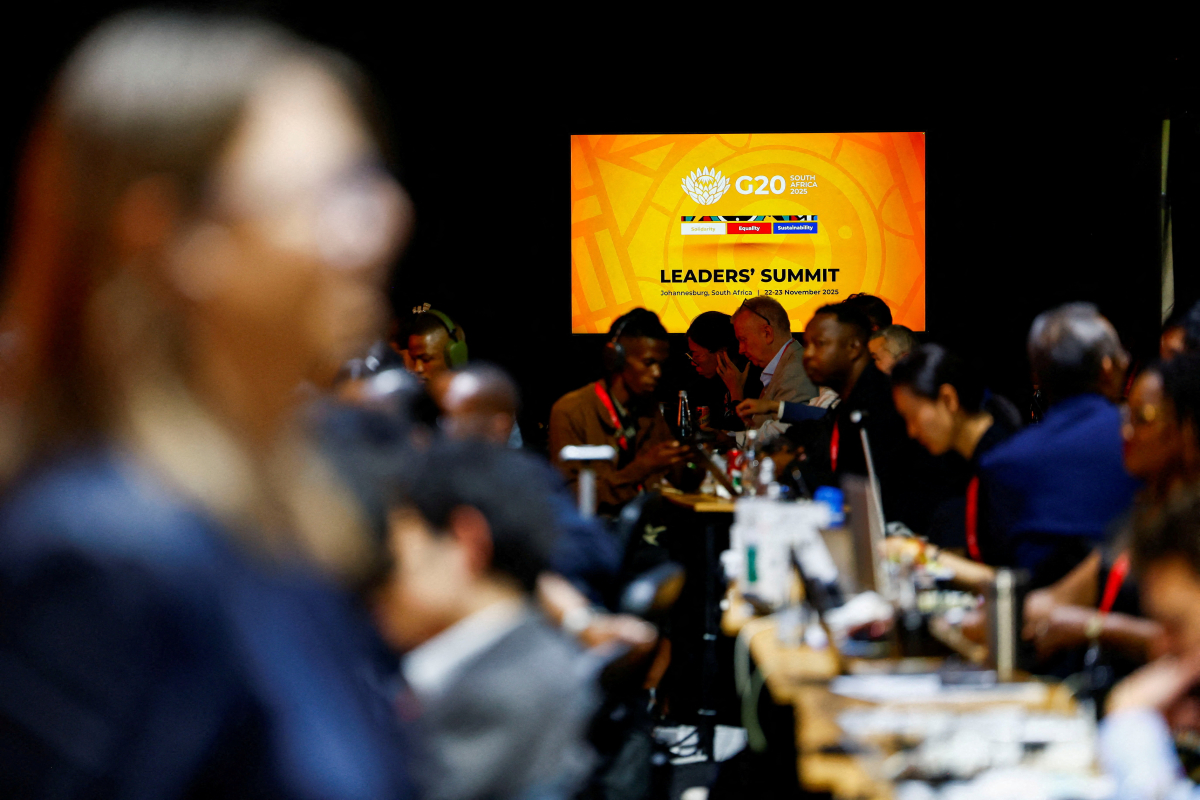U.S. says ‘progress made’ in Iran talks, as Ukraine negotiations continue in Geneva
The United States and Iran reported measured progress after a new round of indirect talks in Geneva aimed at resolving the dispute over Tehran’s nuc...

This weekend's G20 declaration shows a "renewed commitment to multilateral cooperation", South Africa's President Cyril Ramaphosa said on Sunday.
Ramaphosa, host of the Johannesburg summit, managed to secure agreement on a final text addressing issues such as the climate crisis, despite strong objections from the United States, which boycotted the gathering.
At the closing ceremony, he said the outcome demonstrated that world leaders’ “shared goals outweigh our differences”.
U.S. President Donald Trump skipped the 22–23 November summit, on the grounds of allegations, which have been comprehensively falsified, that the host country's Black majority government persecutes its white minority.
He had also rejected South Africa's agenda of helping developing nations transition to clean energy, reduce crippling debt costs and adapt to climate change-related disasters.
Despite Washington's opposition, Ramaphosa secured consensus from the leaders present, aside from Argentina, which did not block the declaration.
It was the first G20 summit held in Africa, and the final text used language long resisted by the U.S. administration. It highlighted the seriousness of climate change, the need for adaptation, praised ambitious renewable energy targets and criticised the heavy debt burdens facing poorer nations.
The summit took place as tensions over Russia’s conflict in Ukraine strain the transatlantic alliance, and shortly after a frustrating COP30 in Brazil, where oil-producing and high-consuming nations prevented any reference to fossil fuels in the final declaration.

Brazil’s President Luiz Inacio Lula da Silva said both the G20 and COP30 showed that multilateralism remains alive.
German Chancellor Friedrich Merz said the United States “was mentioned only in passing” at the G20 summit, adding it played a minor role as new geopolitical connections emerge.
“It wasn’t a good decision for the American government to be absent,” he said.
The United States takes over the rotating G20 presidency after Johannesburg, but South Africa rejected a U.S. proposal to send an embassy official for the handover in Trump’s place, calling it a breach of protocol.
The White House accused Ramaphosa of refusing to facilitate a smooth transition, but South Africa’s Foreign Minister Ronald Lamola said they had not received formal communication.
“We remain open … It’s up to them,” he said.
Lamola noted it was a major achievement that the declaration acknowledged the need for climate finance for developing countries.
Alongside the surprise agreement on the declaration, world leaders also discussed the Russia-Ukraine conflict and Trump’s proposed plan to end it in a series of meetings expected to continue in the coming days.
Cuba’s fuel crisis has turned into a waste crisis, with rubbish piling up on most street corners in Havana as many collection trucks lack enough petrol to operate.
Iran’s Revolutionary Guards navy held military exercises in the Strait of Hormuz on Monday (16 February), state-linked media reported. The drill took place a day before renewed nuclear negotiations between Tehran and Washington in Geneva.
The 2026 Munich Security Conference (MSC) unfolded over three intense days in Munich, confronting a defining question of our era: has the post-Second World War international order collapsed - and if so, what will replace it?
Canadian Prime Minister, Mark Carney, announced on 16 February that the Honourable Janice Charette has been appointed as the next Chief Trade Negotiator to the United States. She's been tasked with overseeing the upcoming review of the Canada-United States-Mexico Agreement (CUSMA).
Ruben Vardanyan has been sentenced to 20 years in prison by the Baku Military Court after being found guilty of a series of offences including war crimes, terrorism and crimes against humanity.
The United States and Iran reported measured progress after a new round of indirect talks in Geneva aimed at resolving the dispute over Tehran’s nuclear programme, while separate negotiations on Russia’s war in Ukraine focused on practical next steps.
An unidentified man was taken into custody on Tuesday (17 February) after running towards the U.S. Capitol carrying a loaded shotgun and wearing tactical gear, according to Capitol Police Chief Michael Sullivan.
Peru’s Congress has voted to censure and remove José Enrique Jeri Ore from his posts as President of Congress and acting President of the Republic, just four months into his tenure, citing undisclosed meetings with Chinese businessmen and alleged hiring irregularities.
France celebrated Olympic gold in the men’s biathlon relay in Anterselva on Tuesday (17 February), following a thrilling race marked by an electric atmosphere at the stadium.
Day 11 of the Milano Cortina 2026 Winter Olympics delivered decisive performances, medal celebrations and emotional tributes as the Games moved deeper into their final stages.
You can download the AnewZ application from Play Store and the App Store.

What is your opinion on this topic?
Leave the first comment